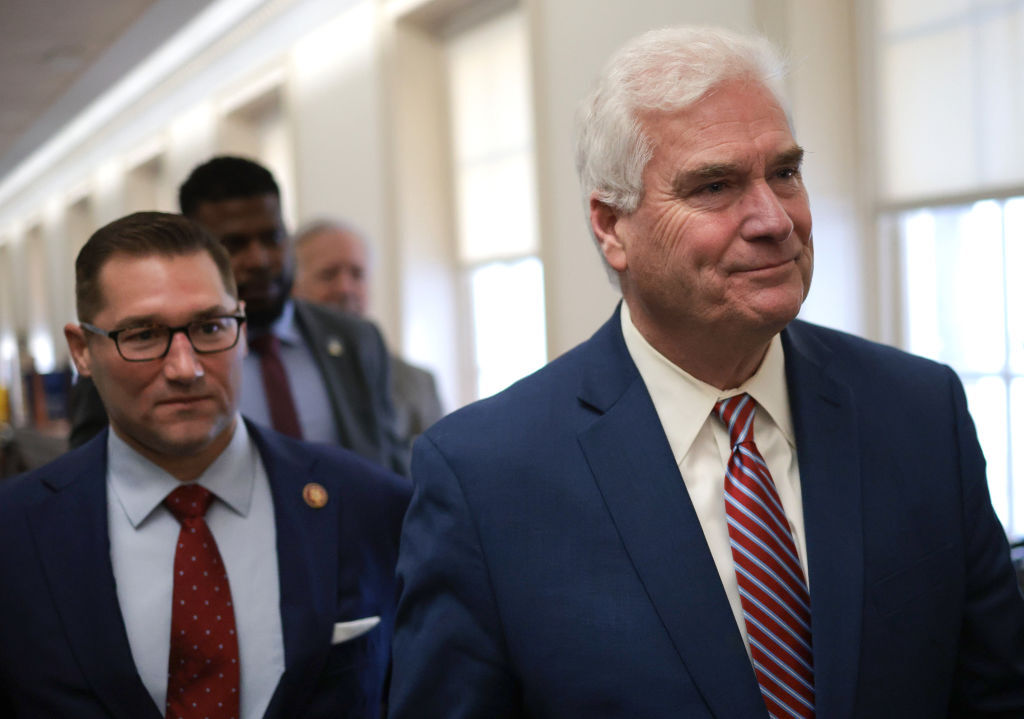Emmer nominated for U.S. House speaker but drops out after Trump opposition

U.S. House Majority Whip Tom Emmer, R-Minn., right, and Rep. Guy Reschenthaler, R-Pa., arrive to a House GOP candidates forum where congressmen who are running for speaker of the House presented their platforms in the Longworth House Office Building on Capitol Hill on Oct. 24, 2023 in Washington, D.C. Win McNamee/Getty Images
WASHINGTON — U.S. House Republicans Tuesday voted to tap Minnesota’s Tom Emmer as speaker following five rounds of ballots — but Emmer quit the race just four hours later, after he was attacked by the GOP’s most powerful figure, former President Donald Trump.
After beating six candidates, Emmer, the No. 3 Republican, faced an uphill battle to coalesce more than 20 hard-right Republican holdouts loyal to Trump, who took to social media shortly after the vote to warn that electing Emmer would be a “tragic mistake.”
“He never respected the Power of a Trump Endorsement, or the breadth and scope of MAGA,” Trump, also a 2024 candidate for president, wrote about Emmer on his site, Truth Social. “He is totally out-of-touch with Republican Voters.”
Emmer, 62, who represents a safe GOP district that includes parts of the western and northern Twin Cities suburbs, the city of St. Cloud and rural areas in between, had continued to meet with holdouts on Tuesday afternoon following the closed-door conference vote.
Emmer quickly left the meeting later Tuesday, dogging reporters chasing after him. He declined to comment before entering a black car. Lawmkers said he dropped out a short time later.
With Emmer out, Republicans will have to begin their nomination process anew and it was unclear how that would proceed.
Emmer would have had to get nearly all of the 221 Republican votes on the House floor, as all Democrats are expected to vote for Minority Leader Hakeem Jeffries. In the final secret ballot, Emmer earned 117 GOP votes, a long way from the 217 needed for the speaker’s gavel if all Republicans are present and voting.
In a roll call conference vote, again behind closed doors, on whether a member would support him on the floor, Emmer’s support grew to 186, according to several lawmakers in the meeting.
Several Republicans leaving Tuesday’s meeting, such as Reps. Steve Womack of Arkansas and Dusty Johnson of South Dakota, acknowledged that Emmer did not have the votes needed to become speaker, but still remained hopeful that Emmer could narrow that gap.
Womack said that because the conference had a roll call ballot, Emmer can see which Republicans were holdouts.
“I expect that Tom would want to meet with the individuals that are not calling his name and see if there is something he can say or do that could bring them around and help shore up their requisite 217,” Womack said. “If he can’t do that, then he’s got to make a decision as to whether he goes to the floor.”
Womack added that there are some members that will always be against Emmer, but he did not name them.
“What I just saw in that room illustrates to me that there are some people that are pretty well dug in and are not going to support the current designee,” he said.
For example, Georgia’s Rick Allen, had already stated he will never vote for Emmer because the Minnesota Republican voted to codify same-sex marriage, according to CNN.
Johnson said that Emmer was working on flipping those holdouts.
“People with concerns are coming forward, and he’s taking them head on,” Johnson said.
When asked how many members voted against Emmer in the roll call vote, Mike Waltz of Florida said “too many.”
Third GOP nominee
Emmer was the third Republican nominee for speaker.
The first, Louisiana’s Steve Scalise never brought his nomination for a floor vote and the second, Ohio’s Jim Jordan, was tossed aside by the party after his third and final unsuccessful floor vote for the speaker’s gavel.
The House has been without a speaker for 21 days.
Emmer, who serves in GOP leadership as the Republican whip, had the endorsement of former Speaker Kevin McCarthy, but would have had to court members and allies of the far-right House Freedom Caucus who are aligned closely with Trump.
On Monday, Emmer posted a video in which he said he has always “gotten along” with Trump, who is also the current GOP front-runner in the 2024 presidential election.
In a Monday campaign stop in New Hampshire, Trump was asked if he’d endorse Emmer. The former president said he’d “always gotten along with” Emmer, but said he was trying to allow House Republicans to choose their own leader.
Emmer posted a video clip of the appearance to X, saying as speaker, he would continue the pair’s “strong working relationship.”
However, by Tuesday, Trump had posted about his opposition to Emmer on his social media site.
Emmer was also one of the few candidates running for the speakership who voted to certify the 2020 election results.
The speaker campaign
On Monday night, as they tried again to elect a speaker, House Republicans heard pitches from eight of their colleagues who had filed by a Sunday deadline. Pennsylvania’s Dan Meuser was also a candidate but dropped out in the middle of the closed-door candidate forum.
Those GOP lawmakers who ran for the speaker’s gavel included Reps. Gary Palmer of Alabama, Byron Donalds of Florida, Austin Scott of Georgia, Mike Johnson of Louisiana, Jack Bergman of Michigan, Kevin Hern of Oklahoma and Pete Sessions of Texas.
Early Tuesday, Scalise, the House majority leader, said the goal is for Republicans to unify behind a nominee and get back to legislative work that has been stalled since McCarthy was ousted earlier this month.
“There’s a lot of work to do,” Scalise said. “All of these things are bills that are ready to go that we want to move.”
Whoever becomes speaker will be tasked with a quickly approaching Nov. 17 deadline for government funding and a nearly $106 billion supplemental aid request from the White House for Ukraine, Israel and global aid and U.S. border security. Emmer will also have to lead in moving must-pass legislation such as the annual defense bill and five-year reauthorization of the farm bill.
On top of legislative duties the new speaker will have to balance striking deals with a White House and Senate controlled by Democrats while also fundraising and protecting vulnerable Republicans and expanding the House’s slim GOP majority in the 2024 elections.
McCarthy said he wants to see the party move beyond its deep fractures and that there must be “consequences” for the eight Republicans who voted with Democrats to oust him.
“It’s frustrating because it’s just a few, these eight, working with all the Democrats to ruin the reputation of the Republicans, but we’ll earn it back,” the California Republican said.
Five ballots for Emmer
Republicans went through five secret ballots on Tuesday to get to a nominee. Some candidates withdrew their names prior to voting to speed the process along, such as Palmer and Meuser.
Sessions was dropped in the first round of ballots; Bergman in the second round; Scott in the third round; Hern in the fourth round; and Johnson in the fifth round. Donalds withdrew in the fourth round.
Because Republicans have struggled to rally behind one candidate, Rep. Mike Flood of Nebraska asked all speaker candidates and GOP lawmakers to sign a unity pledge.
But there were clear signs of dissent.
For the first four rounds of secret ballots, six lawmakers voted either present or for others besides the announced candidates, stirring concern that a candidate may not be able to gain the support of the majority of the conference on the floor.
Bill Huizenga of Michigan said as the final ballot was ongoing, he had a message for those Republicans who voted present: “We got to figure this out. Stop voting present, stop voting for other people. We have two candidates.”
One of those who voted present, Troy Nehls of Texas, said that Emmer had no chance of becoming speaker and that as Republicans, “we are, again, back to where we started.”
Rep. Brett Guthrie of Kentucky said Emmer asked the holdouts to remain in the room after an up-or-down roll call vote to discuss differences.
“So when I left, several people who voted different than Emmer were at the microphone,” he said.
Rep. Ann Wagner of Missouri said she hoped Emmer’s approach would rebuild trust among the conference.
“This is really good because it also does away with this feeling that there are any kind of backroom deals going on or that people are, you know, getting their wish lists,” Wagner said, referring to one-on-one meetings that other speaker candidates have held.
In January, McCarthy made a secret handshake deal with far right conservatives before he won on a 15th ballot.
Mario Díaz-Balart of Florida said that while Donalds was his first choice, he wanted to unify around Emmer whom he described as “honorable.”
As whip “he has the relationships. If he can’t pull it together then we’re running into some very, very difficult times,” he said.
House Democrats continued to criticize the GOP Tuesday.
“Chaos and dysfunction continue to be the order of the day in the House Republican majority. Today is day 21 without a speaker, and the other side is back to square one,” Democratic Caucus Chair Pete Aguilar said at a press conference.
Emmer finances, fundraising
Known in Congress as a promoter of cryptocurrency, Emmer’s own finances are remarkably traditional, according to personal financial reports required of members of Congress.
In his most recent annual report, filed in May, Emmer listed only one asset, an investment account worth between $15,000 and $50,000, and one liability, a mortgage of between $100,000 and $250,000.
He listed no stock holdings, transactions, gifts or other finances — a rarity for congressional financial disclosures that are often more complicated.
A prolific fundraiser as the former head of the House Republican campaign operation, Emmer has raised millions from the cryptocurrency sector and promoted the technology in the House, where he sits on the Financial Services Committee.
He raised $2 million for the National Republican Congressional Committee in the 2022 cycle from the political action committee of Ryan Salame, the former co-CEO of FTX, a crypto firm that went bankrupt after serious allegations of fraud.
Immediately following that scandal, Emmer maintained that the FTX example should not undermine the promise of cryptocurrency itself.
For the current campaign cycle, Emmer has raised a combined $3.7 million for his own campaign and for his leadership PAC. He’s raised $230,000 from contributors in the securities and investment industry — more than any industry other than “retired,” according to the nonprofit campaign spending tracking group Open Secrets.
GET THE MORNING HEADLINES DELIVERED TO YOUR INBOX
The post Emmer nominated for U.S. House speaker but drops out after Trump opposition appeared first on Georgia Recorder.



